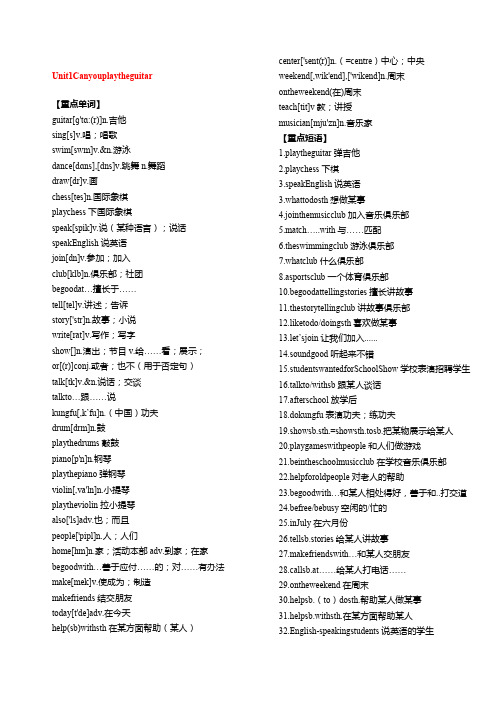七年级下册英语语法总结及单词语法
初一下册英语语法总结

初一下册英语语法总结初一下册英语语法总结7.if+一般现在时.剩下部分一般将来时(will)8.When someone is in trouble we mustn't laugh at him.9.It's the +n beginning of a new term.三种时态:一般过去时态Be动词过去式的句式。
否定句是在was/were后面加not, was not=wasn’t/were not=weren’t。
一般疑问句是把was/were提前并放到句首,要求首字母要大写。
实义动词过去式的句式:肯定式:主语+动词故去式+其它。
如,They had a good time yesterday.否定式:主语+did not+动词原形+其他。
如,They didn’t have a good time yesterday.一般疑问句:Did+主语+动词原形+其它?肯定回答:Yes,主语+did. 否定回答:No,主语+didn’t.如,Did they have a meeting two days ago? Yes, they did. No, they didn’t.特殊疑问句:特殊疑问词+did+主语+动词原形+其他?如,What time did you finish your homework?一般现在时态当主语是第三人称单数时,肯定句为:主语+动词的s形式+宾语否定句为:主语+助动词doesn't+动词原形+宾语疑问句为:Does+主语+动词原形+宾语肯定回答和否定回答也要使用助动词does.注:第三人称单数用了 does 后面就不用动词的s形式了,而用动词原形.动词的一般现在时态, 除了第三人称单数(he she it) 外,其余都用动词原形。
当主语是其他人称时,肯定句为:主语+动词原形+宾语否定句为:主语+助动词don't+动词原形+宾语疑问句为:Do+主语+动词原形+宾语肯定回答和否定回答也要使用助动词do.注:变为疑问句,要在句首加"do" ; 变为否定句, 要在动词前面加"do not", 可以简写为 "don't".知识点:1.现在进行时的主要结构用来表示现在(说话瞬间)正在进行的动作和用来表示当前的活动或现极端一直在进行着的动作。
初一英语下册知识点:语法词汇重点

这篇关于初⼀英语下册知识点:语法词汇重点,是特地为⼤家整理的,希望对⼤家有所帮助!⼀、⼤纲要求词汇单词live, post office, park, dirty, clean, behind, between, if, arrive, hope, koalas, other, friendly, doctor, reporter, dangerous, read, wait, remember, rain, sunny, cool, like, hair, medium build, wear, noodles, soup, did, went, was, practice, felt, expensive, stand, mind, agree, else,短语in front of, have fun, kind of, a little bit, have to, come from,talk about/to重点句型Is there…? Do you want…? How’s the weather?What is/are…doing?What kind of…would you like? what did…do?What do you think of…?⼆、重点解析词语辨析:1. between & amongbetween 常⽤于表⽰两者之间,或⽤于表⽰三者或三者以上的众多事物两两之间among⼀般指在三者或三者以上众多事物之中。
eg:Tom is between Ann and Mary. 汤姆在安和玛丽之间。
They talked among themselves while they waited. 他们⼀边等着⼀边互相谈话。
2. arrive, get & reacharrive到达,需接at或in,再接表地点的名词;at⽤于到达较⼩的地⽅,in⽤于到达较⼤的地⽅。
七年级英语下册语法总结

七年级英语下册语法总结一、七年级下英语语法——词法1、名词A、名词的数我们知道名词可以分为可数名词和不可数名词,而不可数名词它没有复数形式,但可数名词却有单数和复数之分,复数的构成如下:一在后面加s;如:fathers, books, Americans, Germans, apples, bananas二x, sh, ch, s, tch后加es;如:boxes, glasses, dresses, watches, wishes, faxes三1以辅音字母加y结尾的变y为i再加es 如:baby-babies, family-families, duty-duties, comedy-comedies, documentary-documentaries, story-stories2以元音字母加y结尾的直接加s;如:day-days, boy-boys, toy-toys, key-keys, ways四以o结尾加s外来词;如:radios, photos, 但如是辅音加o的加es:如: tomatoes西红柿, potatoes马铃薯五以f或fe结尾的变f为v再加ess;如:knife-knives, wife-wives, half-halves, shelf-shelves, leaf-leaves, yourself-yourselves六单复数相同不变的有:fish, sheep, deer鹿子, Chinese, Japanese七一般只有复数,没有单数的有:people,pants, shorts, shoes, glasses, gloves, clothes, socks八单词形式不变,既可以是单数也可以是复数的有:police警察局,警察, class班,同学, family 家,家庭成员九合成的复数一般只加主要名词,多数为后一个单词;如:action movie-action movies, pen pal-pen pals; 但如果是由man或woman所组成的合成词的复数则同时为复数;如:man doctor-men doctors, woman teacher-women teachers十有的单复数意思不同;如:fish鱼fishes鱼的种类, paper纸papers报纸,卷子,论文, work 工作works作品,工厂, glass玻璃glasses玻璃杯,眼镜, orange桔子水oranges橙子, light 光线lights灯, people人peoples民族, time时间times时代, 次数, chicken 鸡肉chickens 小鸡十一单个字母的复数可以有两种形式直接加s或’s;如:Is I’s, Ks K’s;但如是缩略词则只加s;如:IDs, VCDs, SARs十二特殊形式的有:child-children, man-men, woman-women, foot-feet, mouse-mice, policeman-policemen, Englishman-EnglishmenB名词的格当我们要表示某人的什么东西或人时,我们就要使用所有格形式;构成如下:一单数在后面加’s;如:brother’s, Mike’s, teacher’s二复数以s结尾的直接在s后加’,如果不是以s结尾的与单数一样处理;如:Teachers’ Day 教师节, classmates’; Children’s Day六一节, Women’s Day三八节三由and并列的名词所有时,如果是共同所有同一人或物时,只加最后一个’s,但分别拥有时却分别按单数形式处理;如:Mike and Ben’s room迈克和本的房间共住一间,Mike’s and Ben’s rooms迈克和本的房间各自的房间2、代词项目人称代词物主代词指示代词反身代词人称主格宾格形容词名词性第一人称单数I me my mine myself复数we us our ours ourselves第二人称单数you you your yours yourself复数you you your yours yourselves第三人称单数she her her hers herselfhe him his his himselfit it its its this that itself复数they them their theirs these those themselves3、动词A 第三人称单数当动词是第三人称单数时,动词应该像名词的单数变动词那样加s,如下:一一般在词后加s;如:comes, spells, waits, talks, sees, dances, trains二在x, sh, ch, s, tch后加es;如:watches, washes, wishes, finishes三1以辅音字母加y结尾的变y为i再加es;如:study-studies, hurry-hurries, try-tries2以元音字母加y结尾的直接加s;如:plays, says, stays, enjoys, buys四以o结尾加es;如:does, goes五特殊的有:are-is, have-hasB 现在分词当我们说某人正在做什么事时,动词要使用分词形式,不能用原形,构成如下:一一般在后加ing;如:spell-spelling, sing-singing, see-seeing, train-training, play-playing, hurry-hurrying, watch-watching, go-going, do-doing二以不发音e的结尾的去掉e再加ing;如:dance-dancing, wake-waking, take-taking, practice-practicing, write-writing, have-having三以重读闭音节结尾且一个元音字母+一个辅音字母注意除开字母组合如show –showing, draw-drawing要双写最后的辅音字母再加ing;如:put-putting, run-running, get-getting,let-letting, begin-beginning四以ie结尾的变ie为y再加ing;如:tie-tying系die-dying死lie-lying 位于4、形容词的级我们在对两个或以上的人或物进行对比时,则要使用比较或最高级形式;构成如下:一一般在词后加er或est如果是以e结尾则直接加r或st;如:greater-greatest, shorter –shortest, taller –tallest, longer –longest, nicer- nicest, larger –largest二以重读闭音节结尾且1个元音字母+1个辅音字母字母组合除外,如few-fewer fewest结尾的双写结尾的辅音再加er /est;如:big-bigger biggest, red-redder reddest, hot-hotter hottest三以辅音字母+y结尾的变y为i加er/est;如:happy-happier happiest, sorry-sorrier sorriest, friendly-friendlier friendliestmore friendly most friendly, busy-busier busiest, easy-easier easiest四特殊情况:两好多坏,一少老远good/well - better best many/much - more most bad/ill –worse worstlittle- less least old- older/elder oldest/eldest far- farther/furtherfarthest/furthest5、数词基变序,有规则;一、二、三,自己背;五、八、九、十二;其它后接th;y结尾,变为i, eth跟上去; first, second, third; fifth, eighth, ninth, twelfth; seventh, tenth, thirteenth, hundredth; twenty-twentieth, forty-fortieth, ninety-ninetieth二、七年级英语语法——句式1.陈述句肯定陈述句a This is a book. be动词b He looks very young. 连系动词c I want a sweat like this. 实义动词d I can bring some things to school. 情态动词e There’s a computer on my desk. There be结构否定陈述句a These aren’t their books. b They don’t look nice.c Kate doesn’t go to No. 4 Middle School. d Kate can’t find her doll.e There isn’t a cat here. =There’s no cat here.2. 祈使句肯定祈使句a Please go and ask the man. b Let’s learn Englishc Come in, please.否定祈使句a Don’t be late. b Don’t hurry.3. 疑问句1 一般疑问句a Is Jim a student b Can I help you c Does she like salad d Do they watch TV e Is she reading 肯定回答: a Yes, he is. b Yes, you can. c Yes, she does. d Yes, they do. e Yes, she is.否定回答: a No, he isn’t. b No, you can’t. c No, she doesn’t. d No, they don’t. e No, she isn’t.2 选择疑问句Is the table big or small 回答It’s big./ It’s small.3 特殊疑问句①问年龄How old is Lucy She is twelve.②问种类What kind of movies do you like I like action movies and comedies.③问身体状况How is your uncle He is well/fine.④问方式How do/can you spell it L-double O-K.How do we contact you My e-mail address is cindyjones163.⑤问原因Why do you want to join the club⑥问时间What’s the time =What time is it It’s a quarter to ten a.m..What time do you usually get up, Rick At five o’clock.When do you want to go Let’s go at 7:00.⑦问地方Where’s my backpack It’s under the table.⑧问颜色What color are they They are light blue.What’s your favourite color It’s black.⑨问人物Who’s that It’s my sister.Who is the boy in blue My brother.Who isn’t at school Peter and Emma.Who are Lisa and Tim talking to⑩问东西What’s this/that in English It’s a pencil case.What else can you see in the picture I can see some broccoli, strawberries and hamburgers.11问姓名What’s your aunt’s name Her name is Helen./She’s Helen.What’s your first name My first name’s Ben.What’s your family name My family name’s Smith.12 问哪一个Which do you like I like one in the box.13 问字母What letter is it It’s big D/small f.14 问价格How much are these pants They’re 15 dollars.15 问电话号码What’s your phone number It’s 576-8349.16 问谓语动作What’s he doing He’s watching TV.17 问职业身份What do you do I’m a teacher.What’s your father He’s a doctor.三、七年级英语语法——时态1、一般现在时表示普遍、经常性的或长期性的动作时使用一般现在时,它有:Be 动词:She’s a worker. Is she a worker She isn’t a worker.情态动词:I can play the piano. Can you play the piano I can’t play the piano.行为动词:They want to eat some tomatoes. Do they want to eat any tomatoes They don’t want to eat any tomatoes.Gina has a nice watch. Does Gina have a nice watch Gina doesn’t have a watch.2、现在进行时表示动词在此时正在发生或进行就使用进行时态,结构为sb be v-ing sth + 其它.I’m playing baseball. Are you playing baseball I’m not playing baseball.Nancy is writing a letter. Is Nancy writing a letter Nancy isn’t writing a letter.They’re listening to the pop music. Are they listening the pop music They aren’t listening to the pop music.。
最新版 七年级下册英语单词和句型总结1-12

七年级下册英语重点单词和句子Unit 1 Can you play the guitar?一、重点词组:1.play chess 下象棋play basketball 打篮球play soccer踢足球play volleyball打排球play the guitar弹吉他play the piano弹钢琴play the violin 拉小提琴play the drums打鼓总结:球类、棋类之前不加the,乐器之前加the。
2.join the English /art/music/chess/sports/soccer/swimming/story telling club加入英语、美术、音乐、棋类、运动、足球、游泳、故事演讲俱乐部3.want sth 想要某物want sb to do sth 想要某人做某事4.like to do sth like doing sth 喜欢做某事5. show sb sth/show sth to sb 出示某人某物6.tell stories 讲故事tell sb (not) to do sth 告诉某人(不)去干某事7.be good at telling stories 擅长于讲故事8.write to sb 写信给某人9. be good with 善于应付。
的10.speak English/ Chinese 说英语、中文11. talk to sb 跟。
说talk with sb 与某人交谈12.do kung fu 表演功夫13.help sb with sth 在某方面帮助某人help sb (to) do sth 帮助某人干某事14. at the old people’s home 在敬老院at home 在家go home 回家15. come to the Students’ Sports Center 来到学生运动中心16.play games with therm 与他们一起玩游戏17.call sb at …. 打。
人教版七年级下册英语语法总结

人教版七年级下册英语语法总结Unit 1 Can you play the guitar ?语法聚焦❖情态动词can的用法→can+动词原形,它不随主语的人称和数而变化。
(1)can的用法He can speak English. 他会说英语。
(2)can的句式变化—Can you play chess?你会下象棋吗?—Yes, I can. 是的,我会。
(肯定回答)—No, I can’t. 不,我不会。
(否定回答)Unit 2 What time do you go to school ?语法聚焦(1)时间表达法(2)what time/when引导的特殊疑问句→ 结构:What time+do/does+主语+动词原形+其它Unit 3 How do you get to school?语法聚焦(1)how及由how构成的特殊疑问句(2)how构成的其它特殊疑问词组❖how old how much how manyUnit 4 Don’t eat in class.语法聚焦(1)祈使句:用来发出命令或指示,提出要求、建议、劝告等的句子(2)情态动词Unit 5 Why do you like pandas?语法聚焦(1)Why, what, where引导的特殊疑问句(2)拓展:because❖because表示“因为”,so表示“所以”,但是两个句子不能同时出现在一个句子中,二者用其一即可。
例:Because I am free today,so I can go to the zoo. (×)I am free today,so I can go to the zoo. (√)Because I am free today, I can go to the zoo. (√)❖because后面要加句子,而because of 后面加名词(短语)、代词等。
Unit 6 I’m watching TV.语法聚焦: 现在进行时(1)概念和基本结构(2)现在分词的变化规律拓展:重读闭音节(3)现在进行时的句式变化(4)常和现在进行时搭配的词或短语有now, at the moment,还有警示语“Look!"或“Listen!"等。
七年级下册英语所有必考单词、词组语法总结

begood for···对······有益处begood at···擅长······
helpsbwithsth / doing sth帮助某人干某事help kidswithswimming帮助孩子们游泳
doChinese kungfu表演中国பைடு நூலகம்夫be in参加,加入
play the drums敲鼓play chess下象棋speakEnglish说英语
speak a little English说一点英语say it inEnglish用英语说它
join the artclub加入艺术俱乐部join thebasketballclub加入篮球俱乐部
join theswimming club加入游泳俱乐部what club什么俱乐部
Shedoesn’tlike singing,andshedoesn’t like dancing,either.她不喜欢唱歌,也不喜欢跳舞。
【辨析】
either,too, also
三者都可作“也”讲,但用法稍有不同。
either
用于否定句末尾。
Ididn’tgototheparty,either.
15.in themorning/afternoon/ evening在上午/下午/晚上
16.takeawalk散步ﻩ17.lotsof=a lotof许多,大量ﻩﻩ18.radio station广播电台
19.atnight在晚上ﻩ20.belatefor=arrive latefor迟到
◆用法集萃
◆短语归纳
1.get toschool到达学校ﻩ2.take the subway乘地铁ﻩﻩ3.rideabike骑自行车
人教版英语七年级下册unit1+2核心考点归纳(语法+词汇+短语+重点句子)

人教版七年级下册unit1+2核心考点及语法归纳【unit 1语法】一、情态动词can的基本用法情态动词can有一定的词义,但不能独立存在,它必须与动词原形一起构成谓语。
can没有人称和数的变化。
其具体用法如下:1.表示"能、会",指脑力或体力方面的"能力"。
例如:I can speak English.我会讲英语。
Jim can swim but I can't.吉姆会游泳,但我不会。
2.表示"可能",常用于否定句或疑问句中,指某种可能性。
例如:Han Mei can't be in the classroom.韩梅不可能在教室里。
Can he come here today, please?请问他今天能到这里来吗?3.表示"可以",常用于口语中,指许可或请求做某事。
例如:Can I have a cup of tea, please?请问我可以喝一杯茶吗?You can go out.你可以出去了?二、情态动词的注意事项1. can的口诀:情态动词can、can、can,动词原形跟后面。
变疑问can提前,变否定not后面加上去。
主语人称单复数,情态动词不能变。
2. 情态动词can可以引导肯定句和疑问句。
肯定句:主语+ can + 动词原形+ 其他成分疑问句:can + 主语+ 动词原形+ 其他成分3.can 引导的肯定句变为疑问句的方法:(一调二改三问号)can 提前,首字母大写。
(一调)肯定句中主语在变成疑问句时的变化。
(二改)如:肯定句:You can feed the animals.你可以喂动物。
疑问句:Can I feed the animals?我能喂动物吗?在句尾后面加问号。
(三问号)4. Can的一般疑问句回答:肯定回答:Yes,主语(必须人称代词)+ can.否定回答:No,主语(必须人称代词)+ can not (can’t)/mustn’t. Yes 或no 后要使用逗号,除了I 以外,其他人称都要小写。
人教版七年级英语下册单词,短语,句型,语法总结

Unit1Canyouplaytheguitar【重点单词】guitar[ɡ'tɑ:(r)]n.吉他sing[s]v.唱;唱歌swim[swm]v.&n.游泳dance[dɑns],[dns]v.跳舞n.舞蹈draw[dr]v.画chess[tes]n.国际象棋playchess下国际象棋speak[spik]v.说(某种语言);说话speakEnglish说英语join[dn]v.参加;加入club[klb]n.俱乐部;社团begoodat…擅长于……tell[tel]v.讲述;告诉story['str]n.故事;小说write[rat]v.写作;写字show[]n.演出;节目v.给……看;展示;or[(r)]conj.或者;也不(用于否定句)talk[tk]v.&n.说话;交谈talkto…跟……说kungfu[,k’fu]n.(中国)功夫drum[drm]n.鼓playthedrums敲鼓piano[p'n]n.钢琴playthepiano弹钢琴violin[,va'ln]n.小提琴playtheviolin拉小提琴also['ls]adv.也;而且people['pipl]n.人;人们home[hm]n.家;活动本部adv.到家;在家begoodwith…善于应付……的;对……有办法make[mek]v.使成为;制造makefriends结交朋友today[t'de]adv.在今天help(sb)withsth在某方面帮助(某人)center['sent(r)]n.(=centre)中心;中央weekend[,wik'end],['wikend]n.周末ontheweekend(在)周末teach[tit]v教;讲授musician[mju'zn]n.音乐家【重点短语】1.playtheguitar弹吉他2.playchess下棋3.speakEnglish说英语3.whattodosth想做某事4.jointhemusicclub加入音乐俱乐部5.match…..with与……匹配6.theswimmingclub游泳俱乐部7.whatclub什么俱乐部8.asportsclub一个体育俱乐部10.begoodattellingstories擅长讲故事11.thestorytellingclub讲故事俱乐部12.liketodo/doingsth喜欢做某事13.let’sjoin让我们加入......14.soundgood听起来不错15.studentswantedforSchoolShow学校表演招聘学生16.talkto/withsb跟某人谈话17.afterschool放学后18.dokungfu表演功夫;练功夫19.showsb.sth.=showsth.tosb.把某物展示给某人20.playgameswithpeople和人们做游戏21.beintheschoolmusicclub在学校音乐俱乐部22.helpforoldpeople对老人的帮助23.begoodwith…和某人相处得好,善于和..打交道24.befree/bebusy空闲的/忙的25.inJuly在六月份26.tellsb.stories给某人讲故事27.makefriendswith…和某人交朋友28.callsb.at……给某人打电话……29.ontheweekend在周末30.helpsb.(to)dosth.帮助某人做某事31.helpsb.withsth.在某方面帮助某人32.English-speakingstudents说英语的学生33.Itis+adj+(forsb)tosth.做某事(对于某人来说)是…..34.playthepiano弹钢琴35.playtheviolin拉小提琴36.theStudents’SportsCenter学生运动中心37.needhelptoteachmusic需要帮助来做某事38.needsb.todosth需要某人做某事39.teachsb.todosth教某人做某事40.beinourschoolmusicfestival参加我们学校的音乐节【重点句型】1.—Canyouswim你会游泳吗?—No,Ican’t.不,我不会。
- 1、下载文档前请自行甄别文档内容的完整性,平台不提供额外的编辑、内容补充、找答案等附加服务。
- 2、"仅部分预览"的文档,不可在线预览部分如存在完整性等问题,可反馈申请退款(可完整预览的文档不适用该条件!)。
- 3、如文档侵犯您的权益,请联系客服反馈,我们会尽快为您处理(人工客服工作时间:9:00-18:30)。
七年级下册英语语法总结及单词语法
Unit 7 What does he look like?
一.短语
1 look like 看起来像....
2 curly /short/straight/long hair 卷/短/直发
3 medium height/build 中等高度/身体
4 a little bit 一点儿…
5 a pop singer 一位流行歌手
6 have a new look 呈现新面貌
7 go shopping (do some shopping) 去购物
8 the captain of the basketball team篮球队队长
9 be popular with sb 为---所喜爱
10 stop to do sth 停下来去做某事
11 stop doing sth 停止正在做的事情
12 tell jokes/ stories 讲笑话/ 讲故事
13 have fun doing sth 愉快地做某事
14 remember ( forget) to do sth 记得(忘记)做某事(没有做的)
15 remember (forget) doing sth 记得(忘记)做过某事(已做)
16 one of --- ---中的一个
二.本单元的重点句:
1 Is that your friend? No, it isn’t.
2 What does she look like?
3 I think I know her. ( I don’t think I know her.)
4 Wang Lin is the captain of the basketball team.
5 She’s a little bit quiet.
6 Xu Qian loves to tell jokes.
7 She never stops talking.
8 She likes reading and playing chess.
9 I don’t think he’s so great.
10 I can go shopping and nobody knows me.
11 Now he has a new look.
三.重难点解析
1 What does/ do +主语+ look like? 询问某人的外貌特征,看上去什么样?Eg: What does your friend look like?
2 形容头发时,可按照先长短,后曲直,最后说颜色的顺序说。
Eg: She has long curly black hair.
3 one of + 名词复数,谓语动词要用“单三”形式。
Eg: One of his friends is a worker.
4 不定代词做主语时,谓语动词要用“单三”形式。
修饰不定代词词,应该放在它的后面.Eg:
I can go shopping and nobody knows me.
5.He is …(通常为形容词,包括身高、体形等)He has…(通常为形容词修饰的名词,包括头发、五官)He wears…(穿、戴、留。
可以是衣服、帽子、鞋子等,也可以是眼镜、手表、胡须)
6.I don’t think…的用法表达否定的看法I don’t think she is good-looking.。
